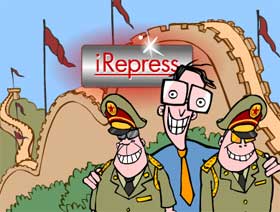So, What do the Chinese do on their 'Censored' Internet ? (The answer is quite surprising)
 Martijn de Waal, journalist and independent media researcher, made an interesting wrap up of the Chinese blogosphere and how people are using the internet in China.
Martijn de Waal, journalist and independent media researcher, made an interesting wrap up of the Chinese blogosphere and how people are using the internet in China.
He started his talk with an animation called iRepress.
There's over 100 million users of internet in China, making it the country with the most internet users in the world. The typical net surfer used to be male, urban, high-educated, in his 20-30. It's becoming less so. Active bottom up. Now more women and less educated people are catching up.
How people use the internet: in China there's a very lively amateur culture. What's different in China from other parts of the world is the huge sense of humour when writing about daily life and world/national events.
Many people make and exchange flash movies, swap lots of files. Commercial portal are thriving (big portals dealing with celebrities for example) but e-commerce hasn't taken off yet.
The Middle Landscape. The internet has become a middle landscape between the public sphere and the commercial sphere. These two separate realms merge on the internet. On blogs and bulletin boards that mostly discuss commercial matters, someone might start a discussion on a recent event (like a murder hidden by the authorities) and a long discussion will start.
The Middle Landscape in another sense: the internet as a middle landscape between the private and the public sphere. Bloggers and wikipedians against the governement. Governement is loosing control over the private domain (in the past, employees had to get an authorisation to get married, it's no longer the case.) The internet is very hard to control although there are rules to restrict what people can write. If you want to open a blog you have to give your name and address. Companies like Google, Microsoft or Cisco, help the governement to shut up the voices and restrict the new freedom.
On the other hand, Chinese have now a service they didn't have before. For each new rules imposed by the government, bloggers and wikipedians make a counter attack.
The Social Brain Foundation is inviting people in the West to adopt a Chinese blog on their personal web server to make it harder to control or block the blogs (only information i found).Are public sphere and civil society emerging? De Waal asked several actors whom have different perspectives.
Jack Qiu: no, we’re not seeing this promised new freedom. In China, internet is given as a toy to people to play with, not to provide them with more possibilities of expression.
Michael Anti (who had his weblog shut down by the governement): yes, there's a gradual development. People are willing to see things change even if the governement doesn't agree.
Webloggers: maybe. People start to organise themselves on the web, give out opinions on small environmental issues for example (government issues are still too taboo). So maybe we're witnessing the beginning of a new civil society.
If you haven't kept up with the news about Google censoring itself in China, these side-by-side screen shots are worth the proverbial thousand words (or should it be two thousand?). Or see for yourself by doing a Google Image search for "tiananmen" here in the U.S. verses Google in China.


3 Comments:
Can anyone with a knowledge of Madarain explain the mention of ChillingEffects.org on the bottom of the page of following Chinese Google search?
http://images.google.cn/images?q=free+tibet&btnG=%E6%90%9C%E7%B4%A2&svnum=10&hl=zh-CN&lr=&cr=countryCN
By Anonymous, at 2/10/2006 10:56:00 AM
Anonymous, at 2/10/2006 10:56:00 AM
Himmm...didn't see the mention of ChillingEffects.org on the bottom of the page...
By Anonymous, at 2/10/2006 12:13:00 PM
Anonymous, at 2/10/2006 12:13:00 PM
not all search engines are like google. check out what the little players in the game have to say about things. it is pretty interesting.
http://www.techtree.com/techtree/jsp/article.jsp?article_id=71001&cat_id=643
By Anonymous, at 2/15/2006 08:07:00 PM
Anonymous, at 2/15/2006 08:07:00 PM
Post a Comment
<< Home